| Listing 1 - 10 of 21 | << page >> |
Sort by
|
Book
ISBN: 9780674997226 0674997220 Year: 2019 Volume: 539 Publisher: Cambridge (Mass.) ; London, England : Harvard University Press,
Abstract | Keywords | Export | Availability | Bookmark
 Loading...
Loading...Choose an application
- Reference Manager
- EndNote
- RefWorks (Direct export to RefWorks)
"This volume contains three rhetorical treatises dating probably from the reign of Diocletian (AD 285-312) that provide instruction on how to compose epideictic (display) speeches for a wide variety of occasions both public and private. Two are attributed to one Menander Rhetor of Laodicea (in southwestern Turkey); the third, known as the Ars Rhetorica, incorrectly to the earlier historian and literary critic Dionysius of Halicarnassus. These treatises derive from the schools of rhetoric that flourished in the Roman Empire from the 2nd through 4th centuries AD in the Greek East. Although important examples of some genres of occasional prose were composed in the 5th and 4th centuries BC by Thucydides, Xenophon, Plato, and especially Isocrates, it was with the flowering of rhetorical prose during the so-called Second Sophistic in the second half of the 2nd century AD that more forms were developed as standard repertoire and became exemplary. Distinctly Hellenic and richly informed by the prose and poetry of a venerable past, these treatises are addressed to the budding orator contemplating a civic career, one who would speak for his city's interests to the Roman authorities and be an eloquent defender of its Greek culture and heritage. They provide a window into the literary culture, educational values and practices, and social concerns of these Greeks under Roman rule, in both public and private life, and considerably influenced later literature both pagan and Christian. This edition offers a fresh translation, ample annotation, and texts based on the best critical editions." -- Provided by publisher
Rhetoric --- Rhetoric, Ancient. --- Rhetoric. --- Rhetoric, Ancient --- Rhetoric - Early works to 1800
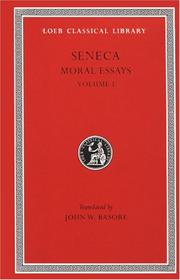
ISBN: 0674992369 0674992806 0674993438 Year: 1935 Publisher: [Place of publication not identified] Harvard University Press
Abstract | Keywords | Export | Availability | Bookmark
 Loading...
Loading...Choose an application
- Reference Manager
- EndNote
- RefWorks (Direct export to RefWorks)
Seneca, Lucius Annaeus, born at Corduba (Cordova) ca. 4 BCE, of a prominent and wealthy family, spent an ailing childhood and youth at Rome in an aunt's care. He became famous in rhetoric, philosophy, money-making, and imperial service. After some disgrace during Claudius's reign he became tutor and then, in 54 CE, advising minister to Nero, some of whose worst misdeeds he did not prevent. Involved (innocently?) in a conspiracy, he killed himself by order in 65. Wealthy, he preached indifference to wealth; evader of pain and death, he preached scorn of both; and there were other contrasts between practice and principle. We have Seneca's philosophical or moral essays (ten of them traditionally called Dialogues)-on providence, steadfastness, the happy life, anger, leisure, tranquility, the brevity of life, gift-giving, forgiveness-and treatises on natural phenomena. Also extant are 124 epistles, in which he writes in a relaxed style about moral and ethical questions, relating them to personal experiences; a skit on the official deification of Claudius, Apocolocyntosis (in Loeb Classical Library no. 15); and nine rhetorical tragedies on ancient Greek themes. Many epistles and all his speeches are lost. The Loeb Classical Library edition of Seneca is in eleven volumes: his moral essays are collected in Volumes I-III; the 124 epistles in Volumes IV-VI; the tragedies in Volumes VIII and IX; and the treatises on natural phenomena, Naturales Quaestiones, in Volumes VII and X. Volume XI contains the short satirical pamphlet Apocolocyntosis (Pumpkinification).
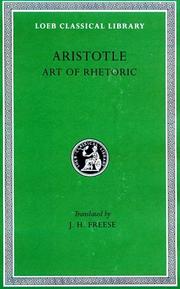
ISBN: 0674992121 9780674992122 Year: 2006 Publisher: Cambridge, Mass. Harvard University Press
Abstract | Keywords | Export | Availability | Bookmark
 Loading...
Loading...Choose an application
- Reference Manager
- EndNote
- RefWorks (Direct export to RefWorks)
Nearly all the works Aristotle (384-322 BCE) prepared for publication are lost; the priceless ones extant are lecture-materials, notes, and memoranda (some are spurious). They can be categorized as practical; logical; physical; metaphysical; on art; other; fragments.
Rhetoric, Ancient. --- Ancient rhetoric --- Classical languages --- Greek language --- Greek rhetoric --- Latin language --- Latin rhetoric --- Rhetoric --- Rhetoric, Ancient --- Language and languages --- Speaking --- Authorship --- Expression --- Literary style
Book
ISBN: 3934005918 Year: 2001 Publisher: Osnabrück Rasch
Abstract | Keywords | Export | Availability | Bookmark
 Loading...
Loading...Choose an application
- Reference Manager
- EndNote
- RefWorks (Direct export to RefWorks)
Bible. --- Rhetoric, Ancient. --- Sermon on the mount --- Criticism, interpretation, etc. --- Criticism, interpretation, etc.
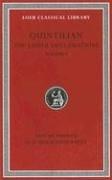
ISBN: 9780674996182 0674996186 9780674996199 0674996194 Year: 2006 Volume: 500-501 Publisher: Cambridge, Massachusetts : Harvard University Press,
Abstract | Keywords | Export | Availability | Bookmark
 Loading...
Loading...Choose an application
- Reference Manager
- EndNote
- RefWorks (Direct export to RefWorks)
Oratory, Ancient. --- Rhetoric, Ancient. --- Speeches, addresses, etc., Latin --- Speeches, addresses, etc., Latin. --- Translations into English. --- Rhetoric, Ancient --- Oratory, Ancient --- Discours latins --- Rhétorique ancienne --- Eloquence antique --- Traductions anglaises --- Speeches, addresses, etc., Latin - Translations into English
Book
ISBN: 9780674997400 0674997409 0674997417 9780674997417 0674997425 9780674997424 Year: 2021 Publisher: Cambridge (Mass.) ; London : Harvard University Press,
Abstract | Keywords | Export | Availability | Bookmark
 Loading...
Loading...Choose an application
- Reference Manager
- EndNote
- RefWorks (Direct export to RefWorks)
"A controversia is a speech purporting to be delivered on behalf of either the prosecution or the defense in an imaginary trial. Slightly simpler is the suasoria, a speech of advice addressed to a mythological or historical character on the verge of making an important decision. Learning how to compose and deliver such speeches, known collectively as declamations (Lat. declamationes, Gk. meletai), was the final stage in the traditional Greco-Roman rhetorical training, which was considered the necessary preparation for public activity throughout the Roman imperial age. Although criticized for the often far-fetched nature of its subjects, declamation remained for more than six centuries the keystone of education for any young citizen who could afford a 'high-school' training. At the same time, this school practice quickly earned the favor of a large audience of professional rhetoricians, enthusiasts, and people of average education: by the 1st century AD, public performances of fictive speeches were among the most popular events in the cultural life of the Roman empire. With its fictional universe of characters, laws, and recurring situations, declamation shaped a cultural background common to the writers and readers of the Greco-Roman world, who all shared the same--more or less standardized--rhetorical education. Among all the extant sources, the nineteen 'Major declamations' wrongly ascribed to Quintilian stand out for their contribution to our understanding of ancient declamation. They are virtually the only fully developed controversiae surviving from pre-medieval Latinity, invaluable because they show how a student was expected to handle the themes, the recurring situations and arguments, the technical rules. And what is more, they lay bare the mistakes that were often made in the process."--
Rhetoric, Ancient. --- Oratory --- Oratory. --- Speeches, addresses, etc., Latin. --- Rhetoric. --- Rhetoric, Ancient --- Speeches, addresses, etc., Latin --- Quintilian --- Oratory, Ancient --- Latin orations --- Latin speeches --- Quintilian. --- Quintilianus --- Marcus Fabius Quintilianus --- Quinctilian --- Quintilien --- Quintiliano, Marco Fabio --- Kvintilijan --- 昆体良 --- Quintiliano --- Quintillian --- Rhétorique antique. --- Art oratoire. --- Ouvrages avant 1800.
Book
ISBN: 2503509525 9782503509525 Year: 2000 Volume: 1 Publisher: Turnhout : Brepols,
Abstract | Keywords | Export | Availability | Bookmark
 Loading...
Loading...Choose an application
- Reference Manager
- EndNote
- RefWorks (Direct export to RefWorks)
Religious studies --- anno 1900-1999 --- Greece --- Rome --- Prayer --- Rhetoric, Ancient --- Prière --- Rhétorique ancienne --- Bibliography --- Religious aspects --- Bibliographie --- Aspect religieux --- Prière --- Rhétorique ancienne --- Bibliography. --- Worship --- Prayers --- Prayer - Greece - Bibliography --- Prayer - Rome - Bibliography
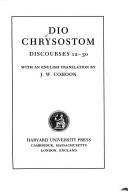
ISBN: 0674993748 0674993950 0674994140 0674994248 9780674992832 0674992830 9780674993747 9780674993952 9780674994140 9780674994249 0434993859 9780434993857 0434992577 9780434992577 0434993395 9780434993390 0434993581 9780434993581 043499376X 9780434993765 Year: 1940 Publisher: Cambridge, MA : Harvard University Press,
Abstract | Keywords | Export | Availability | Bookmark
 Loading...
Loading...Choose an application
- Reference Manager
- EndNote
- RefWorks (Direct export to RefWorks)
Dio Chrysostomus (c. 40-c. 120 CE) was a rhetorician hostile to philosophers, whose Discourses (or Orations) reflect political or moral concerns. What survives of his works make him prominent in the revival of Greek literature in the late first and early second century CE. Dio Cocceianus Chrysostomus, ca. 40-ca. 120 CE, of Prusa in Bithynia, Asia Minor, inherited with his brothers large properties and debts from his generous father Pasicrates. He became a skilled rhetorician hostile to philosophers. But in the course of his travels he went to Rome in Vespasian's reign (69-79) and was converted to Stoicism. Strongly critical of the emperor Domitian (81-96) he was about 82 banned by him from Italy and Bithynia and wandered in poverty, especially in lands north of the Aegean, as far as the Danube and the primitive Getae. In 97 he spoke publicly to Greeks assembled at Olympia, was welcomed at Rome by emperor Nerva (96-98), and returned to Prusa. Arriving again at Rome on an embassy of thanks about 98-99 he became a firm friend of emperor Trajan. In 102 he travelled to Alexandria and elsewhere. Involved in a lawsuit about plans to beautify Prusa at his own expense, he stated his case before the governor of Bithynia, Pliny the Younger, 111-112. The rest of his life is unknown. Nearly all of Dio's extant Discourses (or Orations) reflect political concerns (the most important of them dealing with affairs in Bithynia and affording valuable details about conditions in Asia Minor) or moral questions (mostly written in later life; they contain much of his best writing). Some philosophical and historical works, including one on the Getae, are lost. What survives of his achievement as a whole makes him prominent in the revival of Greek literature in the last part of the first century and the first part of the second. The Loeb Classical Library edition of Dio Chrysostom is in five volumes.
Speeches, addresses, etc., Greek --- Philosophy, Ancient. --- Rhetoric, Ancient. --- Speeches, addresses, etc., Greek. --- History and criticism --- Dio, --- Rome (Empire). --- Chrysostom, Dio --- Chrysostome --- Chrysostomos --- Dio Cocceianus, Chrysostomus, --- Dio Cocceianus, --- Dion, --- Dión, --- Diōn, --- Diōn Kokkeianos, --- Dione,
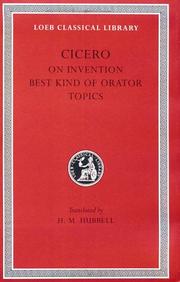
ISBN: 0674994256 9780674994256 Year: 2014 Publisher: Cambridge, MA : Harvard University Press,
Abstract | Keywords | Export | Availability | Bookmark
 Loading...
Loading...Choose an application
- Reference Manager
- EndNote
- RefWorks (Direct export to RefWorks)
We know more of Marcus Tullius Cicero (106-43 BCE), lawyer, orator, politician and philosopher, than of any other Roman. Besides much else, his work conveys the turmoil of his time, and the part he played in a period that saw the rise and fall of Julius Caesar in a tottering republic.
Languages & Literatures --- Greek & Latin Languages & Literatures --- Invention (Rhetoric) --- Rhetoric, Ancient. --- Oratory --- Rhetoric --- Rhetoric, Ancient --- Roman law --- Topic (Philosophy) --- Civil law (Roman law) --- Law, Roman --- Classical languages --- Greek rhetoric --- Latin rhetoric --- Language and languages --- Speaking --- Argumentation --- Oratory, Primitive --- Ancient rhetoric --- Greek language --- Latin language --- Philosophy --- Civil law --- Authorship --- Expression --- Style, Literary --- Speeches, addresses, etc. --- Debates and debating --- Elocution --- Eloquence --- Lectures and lecturing --- Persuasion (Rhetoric) --- Public speaking --- Literary style --- Law
Multi
ISBN: 340203641X 9783402036419 Year: 1987 Volume: 19 Publisher: Münster Aschendorff
Abstract | Keywords | Export | Availability | Bookmark
 Loading...
Loading...Choose an application
- Reference Manager
- EndNote
- RefWorks (Direct export to RefWorks)
Rhetoric in the Bible --- Rhetoric, Ancient --- Bible --- Language, style --- 227.08 --- 227.1 --- #GROL:SEMI-225<08> Neut NF 19 --- #GROL:SEMI-227.08*3 --- Classical languages --- Greek language --- Greek rhetoric --- Latin language --- Latin rhetoric --- Paulinische theologie --- Brieven van Paulus--(algemeen) --- Rhetoric --- Theses --- 227.1 Brieven van Paulus--(algemeen) --- 227.08 Paulinische theologie --- Ancient rhetoric --- Bible. --- Epistles of Paul --- Paul, Epistles of --- Paul Sŏsin --- Pauline epistles --- Risālat al-Qiddīs Būlus al-rasūl al-thāniyah ilá Tīmūthīʼūs --- Language, style. --- Rhetoric, Ancient.
| Listing 1 - 10 of 21 | << page >> |
Sort by
|

 Search
Search Feedback
Feedback About
About Help
Help News
News